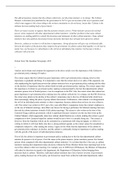Essay
Analyse and evaluate and compare the arguments in the above article over the importance of the Cabinet to government policy making (25 marks)
- Institution
- AQA
Analyse and evaluate and compare the arguments in the above article over the importance of the Cabinet to government policy making (25 marks) A* 22/25
[Show more]



